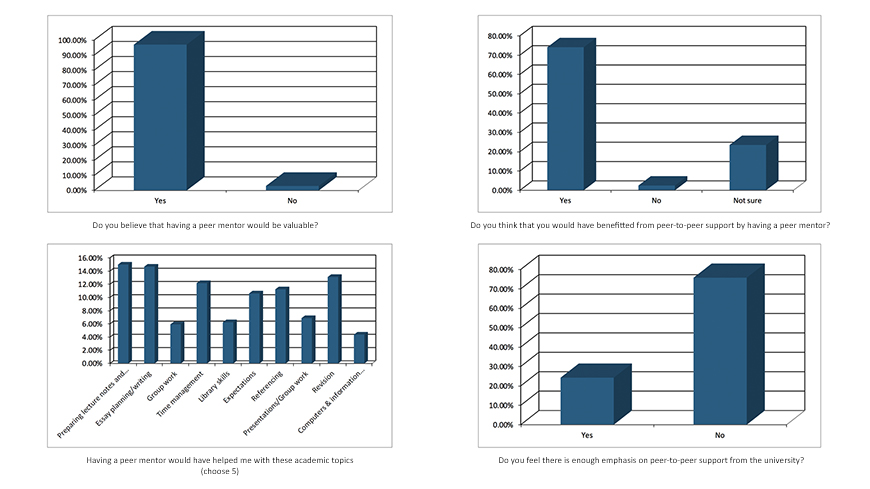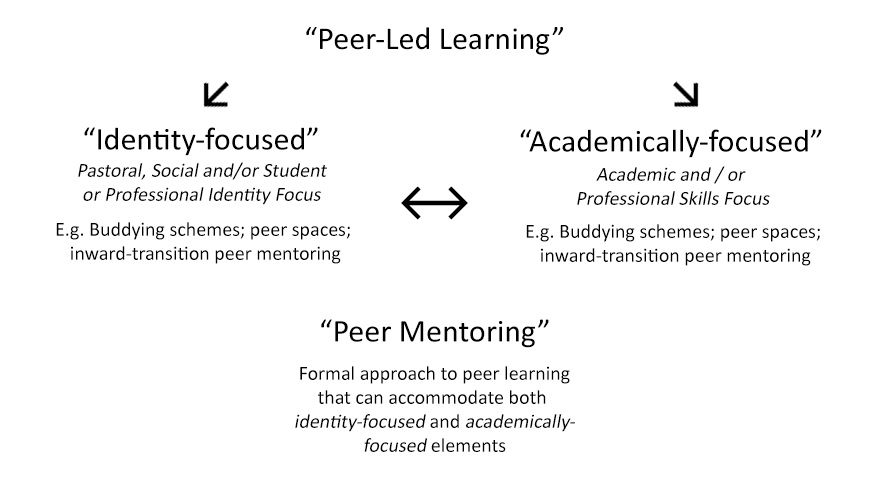Student Peer Support Principles and Guidance for Academic Staff
Introduction
It is particularly important during this time of remote learning that students feel engaged with and are able to actively contribute to their studies and each other, and that there is a sense of community within programmes, modules and the wider university. In the Student Voice survey, the feedback is that students want as much social learning and interaction within their studying as possible. This document has been drafted as part of the Strategic Planning Group Workstream: Student Engagement. It serves to provide definitions of peer support in terms of peer mentoring and peer-led learning and will provide guidance and examples of peer-to-peer activities for staff to consider adopting and promoting alongside their academic involvement with students.
Rationale
There is evidence to suggest that mentoring and related peer-led learning practices are effective in enhancing student retention, attainment and employability. Research shows that:
- Peer mentoring programmes enable undergraduate students to successfully transition to university life enabling them to identify themselves as part of the university community (e.g. Glaser, Hall and Halperin, 2006; Hill and Reddy, 2007)
- Mentoring helps students to cope with demands of the academic work they are required to do (e.g. Quinn, Muldoon, and Hollingworth, 2002).
- Mentoring helps in the career development, leadership development, and retention or academic success among students at risk of failure or attrition (e.g. Jacobi, 1991;Mee Lee and Bush, 2003)
- Having student-led sessions can enable the creation of ‘third-space’ opportunities to assimilate and build confidence and opportunities for the co-creation of learning (e.g. Hilsdon, 2013; Moje, 2007; Haggis 2006).
DMU Student Survey
Part of the development of this support and guidance document included a short survey of current students to establish their views and perceptions of peer-to-peer support/mentoring and learning. Briefly: 81 students started the survey, this reduced to 66 respondents towards the end. Nearly 97% of those questioned felt that having a peer mentor would be valuable,with 74% feeling they would have benefitted from peer-to-peer support. The students reported that peer-to-peer support would have been most useful for specific guidance regarding course content and essay planning and writing, as well as for socialising and managing the work/life balance. Nearly 37% of students would prefer to select their own peer mentor, whilst 45.5% of the students surveyed had no preference. 75% of respondents felt there was insufficient emphasis placed on peer-to-peer support by the university.

The short survey demonstrates that the appetite for peer-to-peer support exists amongst the student population and that the university needs to promote this in all areas.
What does peer-to-peer support mean?
Broadly speaking, mentoring and peer-led learning activities consist of support for student wellbeing and learning that is not provided by DMU academic or professional staff through their substantive roles.
Mentoring consists of a student working with someone with more experience in an area related to study or future employment. In many cases this may not be a fellow student; peer-led learning is a blanket term for student-student interaction and can range from peer mentoring (i.e. mentoring where the more experienced individual is a fellow student or ‘nearPeer’), but can also include peer tutoring, peer assessment and other peer-to-peer activity of a supportive (e.g. ‘buddying’) or pedagogic nature (e.g. Peer-Assisted Learning, or PAL). Peer-led learning encompasses the domain of student learning that is not directly linked to the curriculum or the interventions of academic or professional staff, and thereby constitutes a significant component of the student learning experience.
Peer mentoring can encompass both identity-focused peer learning and academically focused peer learning approaches and is the preferred model for the development of peer-led learning at DMU. The following schematically presents the key approaches to peer-led learning.
Offering a variety of peer-led approaches can be useful within a module activity in ADDITION to synchronous and asynchronous planned delivery. Adding this in offers greater diversity in learning experiences and gives students a greater capacity to be able to directly be involved/engage, rather than feeling overly passive through asynchronous styles. This fits well with the principles of UDL and co-creation.

There are 5 established schemes for mentoring at De Montfort University:
- Dare to Be – Part of Freedom to Achieve (now Decolonising the Curriculum), focused on BAME attainment, but open to all students. Consists of students being mentored by DMU staff, alumni and DMU honorands;
- Peer Mentoring – blanket term covering the wide variety of Faculty /Programme based, formal or informal student mentoring schemes;
- Employability Mentoring - students mentored by external mentors (many DMUAlumni) in business or the professions;
- iBuddies – the international student buddying scheme
- MyUniPal – a DSU initiative focusing on inward transition for new students
Jason Eyre (Chair of the University’s Mentoring Steering Group) and his team are available for further information and support in engaging with any of the above.
Website: https://www.dmu.ac.uk/m4all
General principles for peer-to-peer support
The university is positively endorsing peer-to-peer support as an important part of remote learning and engagement.
All programmes / modules and staff involved with student academic activity should consider how peer-to-peer support can be encouraged and promoted within the academic environment.
Staff should consider all students and ensure that resources used as part of peer-to-peer support are accessible to all. Any suggestions or options for peer-to-peer support should be offered in different ways to ensure all students can participate and gain from the experience.
Staff should consider offering peer-to-peer support on different days and at different times to maximise engagement and sense of community. Where staff are promoting student autonomy relating to peer-to-peer support, they should make students aware of the need for them to recognise equality, diversity and inclusivity as part of their planning.
Did you know?
- There is a centralised mentoring team within Library and Learning Services; please contact Jason Eyre (jeyre@dmu.ac.uk) for further information or take a look at the website: https://www.dmu.ac.uk/m4all
- Library and Learning Services have put together a range of support that you might like to access when considering how to include peer support activities in your teaching
- Every Blackboard Collaborate Ultra site (on a module shell) automatically has a group room which is open all the time for students to talk etc. It could/should be promoted in all modules.
Ideas for including peer-to-peer support in your Programme / Module / Teaching Activity
- BB Collaborate or Microsoft Teams can be used as platforms for initiating peer-to-peer support.
- You could set up ‘virtual coffee’ sessions (these can be arranged in BB Collaborate). These could be for social conversations but also act as an opportunity to run through general questions (not delivery specific) with a member of staff.
- You might like to consider setting up ‘Discourse’ sessions (can be arranged in BB Collaborate). These can help to increase awareness and stimuli from the subject area, this is particularly useful during campus closure when there is less movement and so potentially less stimuli. You might set a theme/reading/song/virtual tour for students to look at and then meet as a group to discuss thoughts and ideas from it.
- Regular Q&A virtual forums / webinars with programme/module/tutor/seminar groups can help to prevent incorrect opinions or ideas about the topic or assessment from being spread amongst the group from student to student. They can also help to reduce email traffic between staff and students that all relate to the same topic.
- You might consider how previous student groups or years could support new students to your programme or module (e.g. how 3rd years might support 2nd years;or new 1st years)
- Within a module Peer Learning Sets can be created by dividing a group into small teams. Each team is set a question on Blackboard; each team uploads their response to the blogs section in Blackboard
- You might like to encourage students to make use of DSU resources to set up their own Club/Society. DSU student societies can have a dual identity/academic focus; including self-study groups. Course leaders would have no input into these groups,but they are an important avenue for peer-to-peer support. For more visit, https://www.demontfortsu.com/activities/studentgroups/startanactivity/
- Once students have been introduced, or have introduced themselves to each other they may wish to interact with each other using platforms of their choice (e.g. FaceTime / WhatsApp etc). As part of our duty of care you should ensure that participants are aware of the ethics/safeguarding/support issues around sharing phone numbers.